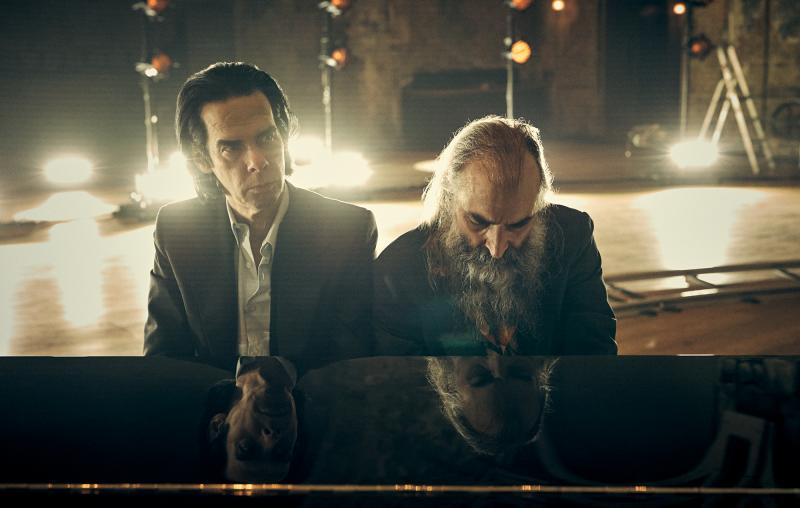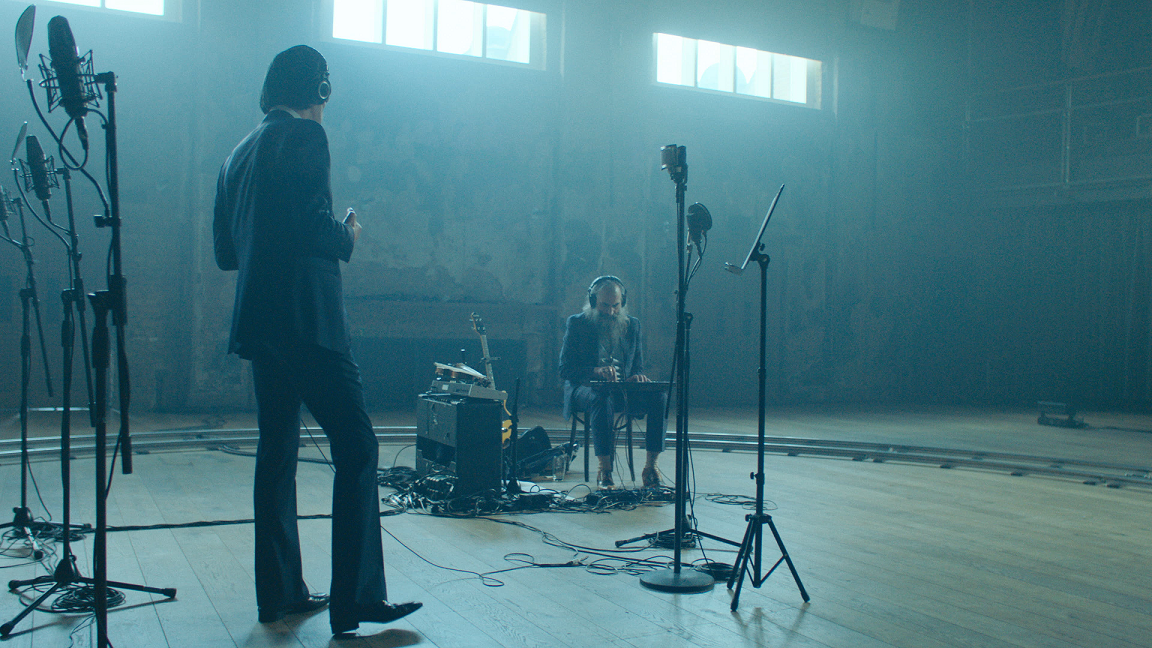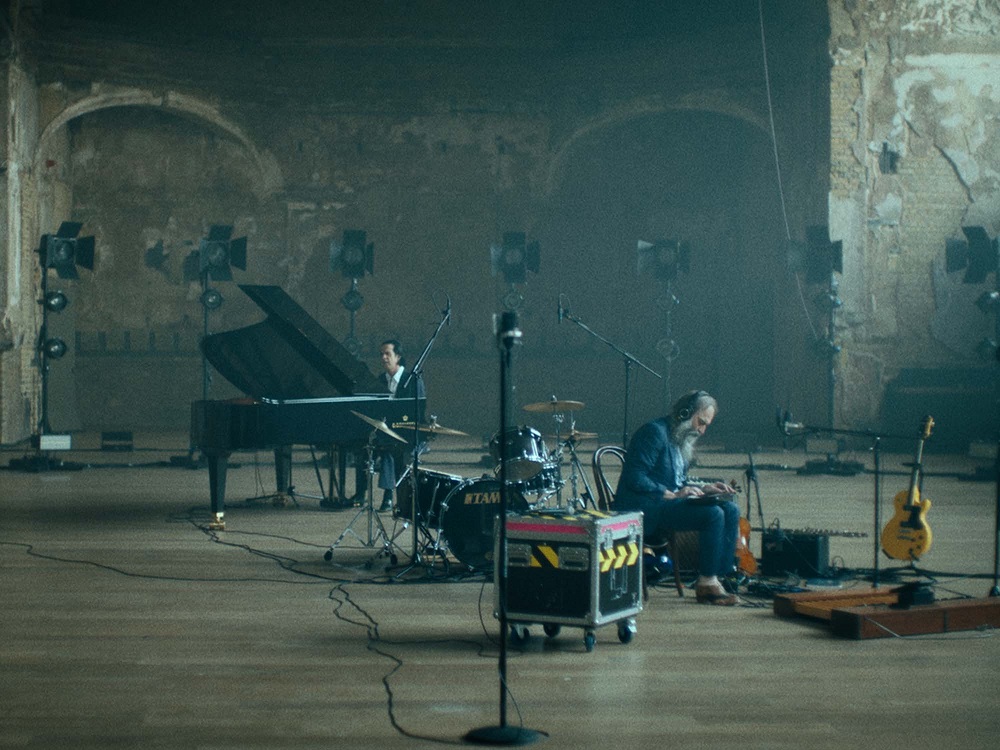This Much I Know to Be True review - Nick Cave’s redemption songs | reviews, news & interviews
This Much I Know to Be True review - Nick Cave’s redemption songs
This Much I Know to Be True review - Nick Cave’s redemption songs
Gripping performance and divine grace in Cave's latest forensic doc

Nick Cave’s cinematic progress has been unexpectedly, catastrophically personal. 20,000 Days On Earth (2014) introduced Bad Seed Warren Ellis as his droll, wild-bearded foil, with scripted, semi-fictitious revelations.
Dominik returns here to film lockdown performances of songs from Ghosteen, the record which truly reckoned with Arthur’s loss and Cave’s survival, in a seemingly more straightforward, pandemic version of a concert film, much like Idiot Prayer: Nick Cave Alone at Alexandra Palace (2020). In fact, it continues the singer’s unexpected ascent to painfully won grace.
Dominik shot the performances in five days, in Battersea Arts Centre. He reveals banks of lights and circling cameramen like a magic trick in plain sight, string quartet and backing vocalists materialising and vanishing in the edit as Ellis conducts and capers like a shaman, and Cave inhabits each word, spot-lit like a priest at the pulpit. Those lights pulse like hot and cold suns, and colour Cave’s close-up face sallow. They climax with the blinding white light and plunging darkness of “Hollywood”, his account of a star in LA twilight. The music is suspended, relentless, synths sighing as he sings a falsetto parable, realising the city’s “a long way to go to find peace of mind”, as his family did when they returned with their grief to Brighton.
 Cave has entered the rock star pantheon in the last decade, partly due to ambitious career management – he wasn’t playing the O2 Arena or making US strides before – but mostly thanks to his work’s rare seriousness and consistency. These recent films’ hyper-intense, breathless sensitivity to his movements and thoughts would take the smallest nudge to tip into preciousness and pretension, Aussie irreverence keeping Cave, Ellis and Dominik on the tightrope.
Cave has entered the rock star pantheon in the last decade, partly due to ambitious career management – he wasn’t playing the O2 Arena or making US strides before – but mostly thanks to his work’s rare seriousness and consistency. These recent films’ hyper-intense, breathless sensitivity to his movements and thoughts would take the smallest nudge to tip into preciousness and pretension, Aussie irreverence keeping Cave, Ellis and Dominik on the tightrope.
Cave’s wife Susie Bick was a major part of One More Time with Feeling’s bereft, wracked confessional. Dominik barely touches domestic life this time, focusing brief offstage interludes on Ellis and Cave’s musical relationship: a “strange, meditative” thing for Ellis, which makes Cave “sift through an ocean of bullshit”, counters the singer, who imagines himself the helpless victim of his friend's enthusiasms. Nearer the Seeds-ologists' knuckle, Dominik asks Cave about Ellis’s early band status, alongside the likes of Mick Harvey (who lost the right-hand role to him, and left). “He started in a subordinate role, and then slowly, one by one, he started taking out the other Bad Seeds,” Cave chortles. “I’ll be the next to go…"
Dominik’s feature films have investigated extreme violence and myth-making in the fantastical criminal biopic Chopper (2000) and the sombre, meditative, Cave and Ellis-scored Western The Assassination of Jesse James by the Coward Robert Ford (2007). A cameo here by Marianne Faithfull, suffering with an oxygen mask after illness, vulnerably embarrassed by the cameras but toughly committed to the work, is a poignant vignette of iconic rock life.
 Cave’s Red Hand Files blog has made him, amongst other things, a grief guru. It’s a “spiritual process”, he explains, tempering his nature with compassion’s requirements. In One More Time with Feeling, he carried Arthur’s loss like a chasm in his heart and flinched from pity. Now, this divinely minded songwriter has gained redemptive wisdom. “We are not in control,” he realises, but “not without power…you can move towards the opportunities presented to you” by life’s “vagaries”. In the following song from Cave and Ellis’s 2021 album Carnage, “White Elephant”, a protagonist is reassuringly still moved “to shoot you in your fucking face”, as strobes pound through its surreal, Trumpian apocalypse towards the gospel ecstasy of “a kingdom in the sky”.
Cave’s Red Hand Files blog has made him, amongst other things, a grief guru. It’s a “spiritual process”, he explains, tempering his nature with compassion’s requirements. In One More Time with Feeling, he carried Arthur’s loss like a chasm in his heart and flinched from pity. Now, this divinely minded songwriter has gained redemptive wisdom. “We are not in control,” he realises, but “not without power…you can move towards the opportunities presented to you” by life’s “vagaries”. In the following song from Cave and Ellis’s 2021 album Carnage, “White Elephant”, a protagonist is reassuringly still moved “to shoot you in your fucking face”, as strobes pound through its surreal, Trumpian apocalypse towards the gospel ecstasy of “a kingdom in the sky”.
“I’m much happier now than I used to be,” Cave anyway concludes. “The very nature of the world is meaningful. And people are meaningful beings.” His art now comes second to his humanity, changing this film's sensibility. The death this week of Cave’s son Jethro is an unknowable further blow. I hope the benign, divinely comforted man caught working here endures.
- 'This Much I Know to Be True' is in cinemas for one night on May 11, with selected screenings thereafter
- More film reviews on the artsdesk
The future of Arts Journalism
You can stop theartsdesk.com closing!
We urgently need financing to survive. Our fundraising drive has thus far raised £49,000 but we need to reach £100,000 or we will be forced to close. Please contribute here: https://gofund.me/c3f6033d
And if you can forward this information to anyone who might assist, we’d be grateful.

Subscribe to theartsdesk.com
Thank you for continuing to read our work on theartsdesk.com. For unlimited access to every article in its entirety, including our archive of more than 15,000 pieces, we're asking for £5 per month or £40 per year. We feel it's a very good deal, and hope you do too.
To take a subscription now simply click here.
And if you're looking for that extra gift for a friend or family member, why not treat them to a theartsdesk.com gift subscription?
more Film
 Anemone review - searching for Daniel Day-Lewis
The actor resurfaces in a moody, assured film about a man lost in a wood
Anemone review - searching for Daniel Day-Lewis
The actor resurfaces in a moody, assured film about a man lost in a wood
 Train Dreams review - one man's odyssey into the American Century
Clint Bentley creates a mini history of cultural change through the life of a logger in Idaho
Train Dreams review - one man's odyssey into the American Century
Clint Bentley creates a mini history of cultural change through the life of a logger in Idaho
 Palestine 36 review - memories of a nation
Director Annemarie Jacir draws timely lessons from a forgotten Arab revolt
Palestine 36 review - memories of a nation
Director Annemarie Jacir draws timely lessons from a forgotten Arab revolt
 Relay review - the method man
Riz Ahmed and Lily James soulfully connect in a sly, lean corporate whistleblowing thriller
Relay review - the method man
Riz Ahmed and Lily James soulfully connect in a sly, lean corporate whistleblowing thriller
 Die My Love review - good lovin' gone bad
A magnetic Jennifer Lawrence dominates Lynne Ramsay's dark psychological drama
Die My Love review - good lovin' gone bad
A magnetic Jennifer Lawrence dominates Lynne Ramsay's dark psychological drama
 Bugonia review - Yorgos Lanthimos on aliens, bees and conspiracy theories
Emma Stone and Jesse Plemons excel in a marvellously deranged black comedy
Bugonia review - Yorgos Lanthimos on aliens, bees and conspiracy theories
Emma Stone and Jesse Plemons excel in a marvellously deranged black comedy
 theartsdesk Q&A: director Kelly Reichardt on 'The Mastermind' and reliving the 1970s
The independent filmmaker discusses her intimate heist movie
theartsdesk Q&A: director Kelly Reichardt on 'The Mastermind' and reliving the 1970s
The independent filmmaker discusses her intimate heist movie
 Blu-ray: Wendy and Lucy
Down-and-out in rural Oregon: Kelly Reichardt's third feature packs a huge punch
Blu-ray: Wendy and Lucy
Down-and-out in rural Oregon: Kelly Reichardt's third feature packs a huge punch
 The Mastermind review - another slim but nourishing slice of Americana from Kelly Reichardt
Josh O'Connor is perfect casting as a cocky middle-class American adrift in the 1970s
The Mastermind review - another slim but nourishing slice of Americana from Kelly Reichardt
Josh O'Connor is perfect casting as a cocky middle-class American adrift in the 1970s
 Springsteen: Deliver Me From Nowhere review - the story of the Boss who isn't boss of his own head
A brooding trip on the Bruce Springsteen highway of hard knocks
Springsteen: Deliver Me From Nowhere review - the story of the Boss who isn't boss of his own head
A brooding trip on the Bruce Springsteen highway of hard knocks
 The Perfect Neighbor, Netflix review - Florida found-footage documentary is a harrowing watch
Sundance winner chronicles a death that should have been prevented
The Perfect Neighbor, Netflix review - Florida found-footage documentary is a harrowing watch
Sundance winner chronicles a death that should have been prevented
 Blu-ray: Le Quai des Brumes
Love twinkles in the gloom of Marcel Carné’s fogbound French poetic realist classic
Blu-ray: Le Quai des Brumes
Love twinkles in the gloom of Marcel Carné’s fogbound French poetic realist classic

Add comment